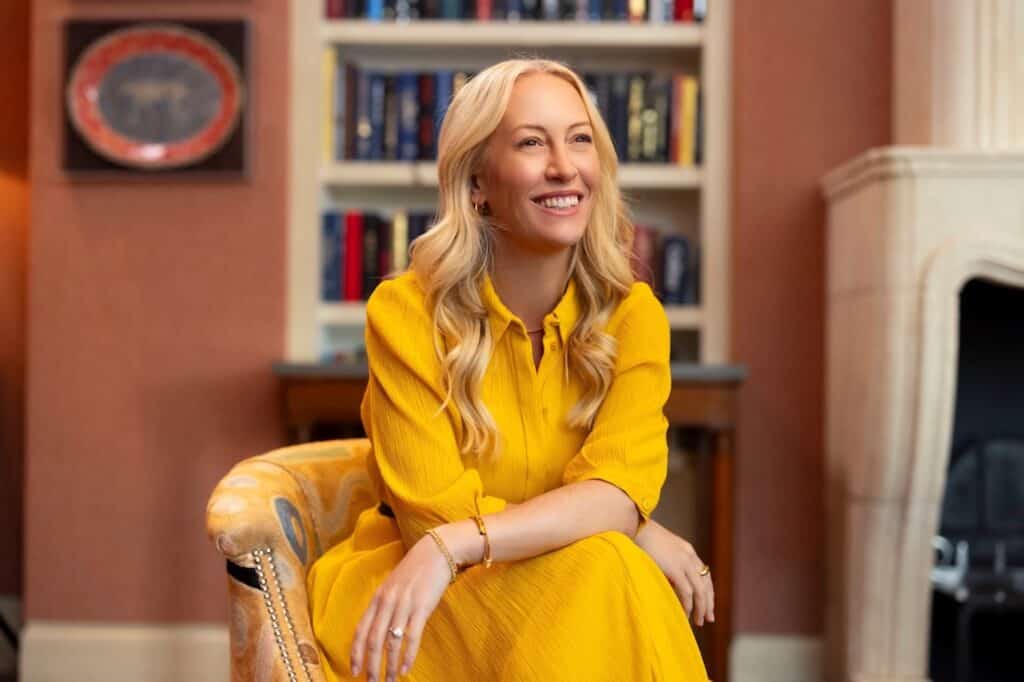Last updated on March 20, 2025
Tania Boler never intended to start a tech company. Now, she’s Founder & President of Elvie, one of the UK’s most successful femtech businesses.
Despite working in women’s health for fifteen years, it wasn’t until Tania Boler became pregnant that she realised how much she didn’t know about her body – particularly her pelvic floor. This revelation sparked her entrepreneurial journey and she went on to raise record-breaking funds to build leading UK femtech company, Elvie.
Founded in 2013, Elvie has a range of products reimagining pelvic floor health and breast pumping for women. It has since grown to over 200 employees, received more than $100m in investment from major players like BlackRock and Octopus Ventures, and is helping mothers all over the world to take control of their wellbeing.
Starting Elvie: A Gap in the Market
“I never planned to start a tech company,” Tania reflects, “but I realised there was a massive need for innovative and empathetic technology to support women.”
Tania worked as a sexual health researcher for the UN and global NGOs, working on highly stigmatised issues like HIV prevention and access to safe abortion. She saw technology’s potential to disrupt the healthcare industry, and wanted to use that force to target the issues women face during motherhood.
After conducting her own research, Tania found that one in three women experience pelvic floor problems in their lifetime, an issue largely ignored in the UK. The shocking statistics around incontinence and prolapse made the need for innovation clear, and she was determined to change the sector and the cultural norms within it.
Giving women real-time biofeedback is the most reliable way to encourage commitment to pelvic floor training, but this technology was only available in hospitals at the time. Tania set out to create a smart pelvic floor trainer and app that gives the real-time biofeedback that seemed so inaccessible to women, while making it fun and convenient. She launched Elvie in 2013.
Raising Investment: Challenging Unconscious Bias
Raising capital for a business focused on women’s intimate health presented its own unique challenges, particularly when pitching to predominantly male investors. Startups founded by women raise just 10% of total VC funding in Europe, and women-only founded startups raise just 2% of funding in the US.
In 2019, Elvie raised $42m in Series B funding, the largest funding round in femtech history at the time, followed by a further $80 million at Series C, with total investment at more than $136m to date.
“It was hard work to sell them on the notion that women will talk openly about pelvic floor health”, Tania recalls. “At one point, I was even told that women’s health products were ‘too niche’, which was hard to fathom considering these tools can address the needs of 51% of the global population.”
It took multiple fundraising meetings for Tania to realise that she needed to be upfront about women’s issues. If an investor seemed uncomfortable with her vision, she knew they wouldn’t be a good fit for one another.
Whilst unconscious bias still persists, investor perceptions towards women’s health are starting to change. With VCs raising billions for healthcare-focused funds, new health tech companies are cropping up and the global femtech market is expected to reach $177 billion by 2032.
“It can be intimidating to jump into something when you haven’t seen many examples set by other female friends or leaders. However, there is a growing network of extraordinary, like-minded female entrepreneurs out there who are willing to support you and help you to make essential connections”.
The Future of Femtech
Tania is not alone in the UK femtech space. Another top UK femtech company, Flo Health, raised more than $200m in Series C investment from General Atlantic at a $1b+ valuation in July 2024.
As the femtech sector continues to grow, there is enormous potential in combining new technologies to enhance women’s health solutions.
“I’m so excited for the potential of AI in femtech, particularly for the early detection and diagnostics of women’s health issues,” Tania explains. “Many femtech startups have been focused on the connected devices space, but now we can look much more at the analytics side.”
If conducted responsibly with the various risks in mind, AI can be leveraged to improve the accuracy of difficult diagnostics such as with polycystic ovary syndrome, or endometriosis. We can start identifying biomarkers for biopsies so that women can get to detection and diagnosis much earlier.
Tania Boler’s Advice for Women Entrepreneurs
One in six women globally intend to start a business, compared with one in five men. To harness this intention, we need more women to continue into engineering and STEM at university level and beyond.
“Fostering an entrepreneurial mindset starts with their early education, so young women should continue to be encouraged to follow those passions,” Tania notes.
Leading a company requires constant adaptability, drive, determination, and resilience. There are often challenges that will knock you, Tania says, so it’s important to be able to make decisions and not get caught up in criticism.
“It can be hard to hear criticism about something you’re so passionate about and have worked so hard for, but sometimes, this is what you need to hear for positive change.”
For more stories from inspirational women founders, download our 100 Women to Watch Report.
 All Posts
All Posts


